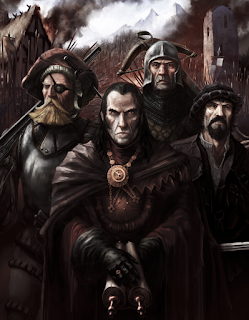Lethality
Thanks to the good people over at reddit, I have a backlog of topics to expound on, including those cursorily mentioned in my first two posts. After much deliberation, I have decided that lethality is the subject of highest importance when discussing the OSR through the lens of 5E. In many discussions on many internet forums, I have seen lethality as the definitive kill switch for enthusiasm when it comes to new players entering from modern editions. It can be discouraging when you play a new game for the first time and die over and over again. How can you expect to have any fun when your character dies before accumulating any loot or experience? It's a fair criticism to make about OSR systems, and the reality is not so straightforward.
Let's take a look at some of the main underlying causes of lethality in an OSR game and how players can manage them so everyone has a good time:
1. Slow recovery of hit points - there are no healing surges, and you can't roll hit dice to recover during a rest. Typically, you recover 1 HP (or 1d3, depending on the system) per full night's rest. Higher recovery can be made with complete bedrest in a safe town. Potions of healing are uncommon, and cannot be bought. If you are lucky enough to have a cleric in your party, that will be your main recourse for rapid healing. This mechanic makes hit points more of a precious resource, and it should be managed with extreme caution whenever there is a possibility of taking damage.
2. Hit die disparity - While hit dice vary depending on character class (from a d10 for fighters, down to a d4 for magic-users) the default hit die for any monster is a d8. Obviously there are several exceptions, but on average, the monsters your party will encounter have more HP than the PCs. Monsters will more often than not outnumber the PCs as well. This creates a need for strategic planning and clever tactics whenever enemies could be engaged in combat. Players who do not circumvent a head-to-head melee will inevitably suffer the attrition of hit points and either die in combat or flee the dungeon with their tails between their legs until they can recover and return.
3. Save or die mechanics - OSR games have several instances of "save or die", where the PCs must make the relevant saving throw or suffer instantaneous death, regardless of hit points. Certain types of poison can create such a situation. Death magic is another cause. Traps can also be deadly. Rocks falling? Cliché, but insta-death all the same. Players should be constantly on the lookout for clues as to what could kill them. Even more importantly, DMs need to make such clues readily apparent. Telegraphing lethal situations to the players is one of the DM's most important responsibilities.
Compare the above to 5E's benevolent mechanics. Roll hit dice during a short rest to recover HP. Hit dice regenerate at the end of a long rest. Healing magic for several classes, not just the cleric. Magical items are commonly bought and sold, including potions of healing. Enemies have a challenge rating to keep everything even in case of a head-on engagement. Constitution bonuses to HP with each level. 5E was written with the intent that all characters can survive, so the narrative may continue. The average OSR narrative is built by the players upon the bones of those who didn't make it.
Let's also consider what lethality does to enhance gameplay. A persistently dangerous environment will bring out brilliant creativity in the best players, over-zealous paranoia in the worst. Either result will increase the longevity of their very mortal characters. Every victory for the party feels well-earned, and even in defeat, escaping with their lives will feel like a small triumph. Players will learn to rely on other central mechanics, like henchmen and hirelings, to tip the odds in their favor. A more fervent interest in the lay of the land about them will take hold, as they search the terrain for the slightest advantage it could yield. The investment in the game is much more intense when the stakes are higher.
Speaking of investment, let's talk about regret. Have you ever had a beloved character die unexpectedly in a 5E game? Like, permanently? Odds are slim, but if it's happened to you, you'll remember the regret at having carefully crafted a background, motivation, and ethos during character creation, only to never see their arc completed. This is part of why absolute death in 5E is so easy to avoid. Character development has become as much a part of the game as rolling dice, to the point where it has its own section on the character sheet. It is my opinion that the better campaign will always emerge from the players' decisions they make at the table, as they develop their own goals after a few outings of "adventuring for adventure's sake". Those who die in this pursuit will feel less of the sting of never having achieved the peak of some pre-planned character arc, but rather feel satisfied they accomplished what they did in the time given to them.
The point I want to make is that the grognards bragging about how lethal their campaigns are only do so because they feel pride and accomplishment for the handful of PCs that overcame that hurdle and went on to be wealthy, successful adventurers. That's what every old-school DM wants for their players; I promise the majority of them aren't actively trying to kill your characters. Unless they're running Tomb of Horrors.




Comments
Post a Comment